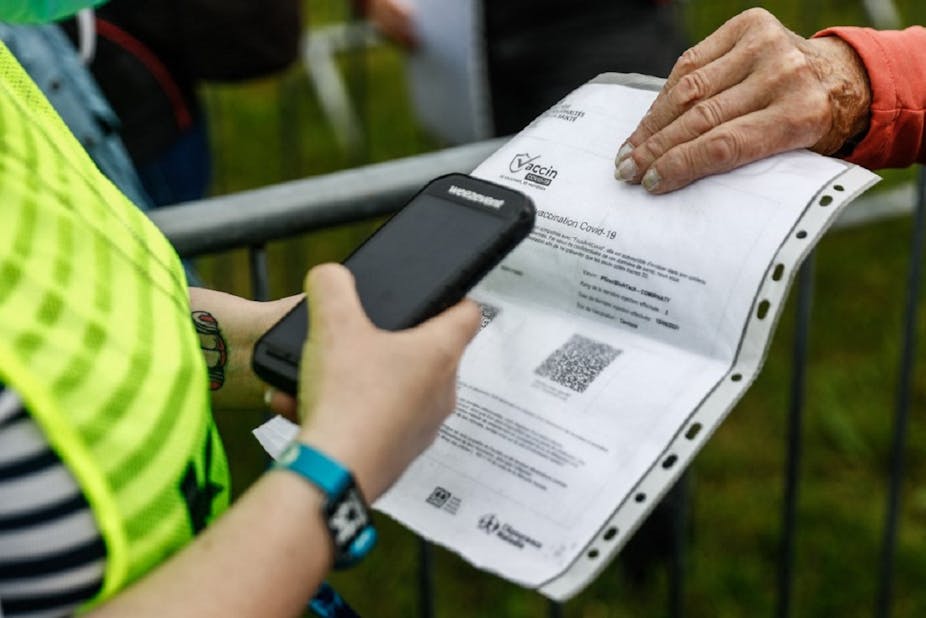The French parliament has passed a law mandating the use of a Covid-19 health pass in order to access public spaces such as restaurants, cinemas, trains and museums. The pass provides proof that the holder has either been vaccinated, recently tested negative for Covid-19 or recovered from the disease. The law also mandates all health workers to get vaccinated by September 15, or risk suspension.
In the two weeks since President Emmanuel Macron announced the new measures, millions of people in France have rushed to book vaccinations, but thousands have also protested the measures, claiming they are an infringement on personal freedoms. On July 24, 160,000 people turned out in demonstrations against the imposition of the health pass.
When France’s vaccination campaign began in January 2021, it was based on the principle of free and informed consent. But the announcements of compulsory vaccination for health workers and the widespread adoption of the health pass have changed that. Without making vaccination compulsory for the entire population (which would mean abandoning the principle of consent entirely), the pass makes vaccination necessary to participate in public life.

So is this an infringement of people’s rights? In a previous article, I argued that the obligation to wear a mask did not constitute an infringement of fundamental freedoms. On the contrary, although strongly criticised by some as an attack on personal liberties, the mask mandate allows us to guarantee our freedoms by keeping public space accessible to all, with precautions that are not overly costly for the individual.
The health pass, however, poses problems of a completely different order. The issue is not compulsory vaccination as such – 11 vaccines are currently compulsory in France, including those preventing tetanus and diphtheria.
Instead, the problem is the way that this non-compulsory but effectively required Covid-19 vaccine risks causing social exclusion and increasing inequalities, especially among already vulnerable populations.
A burden on the young
The most concerning aspect of this measure is the fact that it will apply to children aged 12 and above from September 30. The difficulty here doesn’t just relate to a child’s capacity to make an autonomous and informed decision about vaccination. It’s also that their very access to health services, and therefore to vaccination, remains subject to their parents’ will and convictions. Indeed, parental agreement is required for under-18s to receive the Covid vaccine at all.
This means that young people whose parents refuse vaccination could be excluded from cultural and public life. Without access to museums, cinemas, libraries, sports activities or meeting places, their opportunity to develop through exposure to new perspectives and cultural environments may be compromised.
This is particularly worrying as these restrictions risk further undermining the most marginalised and disadvantaged individuals in our society, and increasing the inequalities of opportunity that already exist.
It is worth asking whether this measure represents too high a cost, especially as it places much of the responsibility for protecting the lives of the most vulnerable on young people.
Increasing inequalities
The introduction of the health pass also risks increasing inequalities and divisions in society among adults. The most vulnerable and marginalised people, including the homeless and the undocumented, have easier access to vaccination in France than in some other European countries. But poor access to information and their overriding social situation can still be obstacles to receiving their doses.
The measures risk also infringing on freedom of movement, given that the EU currently has enough doses to vaccinate 70% of its adult population, and that vaccination strategies vary from one country to another. The vaccine pass is thus likely to call the Schengen passport-free travel area of Europe into question.

Beyond inequalities in access to the public sphere, the introduction of the health pass for everyday activities poses a serious problem regarding the disclosure and protection of personal data.
The pass is mainly available through the government’s app, TousAntiCovid (Everyone Against Covid). This means the choice to go to a public venue is also a choice over whether to agree to disclose information about our identity and health status to the app. For many people who will still have to travel to work by public transport or to places that require the pass, this will be a forced choice.
This is partly why the government’s panel of scientific advisers on Covid recommended back in May that health passes only be used for large gatherings, not for daily life.
Persuasion, not coercion
Emergency situations require strong measures and sometimes restrictions on our individual freedoms. But such policies must ensure that these freedoms are infringed as little as possible, without creating new vulnerabilities.
The implementation of the health pass could prove to be too high a price to pay to get back to life as it was before and “drop the masks”, as health minister Olivier Véran promised on 13 July. Either way, it is not fair to extend it to minors without also giving them the right to decide for themselves about getting vaccinated.
If the health pass increases inequalities in access to public space and culture, it may seriously harm entire segments of the population that have already been hit hard by the pandemic, and whom it is also the duty of the state to protect.
In this context, compulsory vaccination for the entire adult population might be a less bad solution, at least from a moral point of view, than the health pass, although it would have been preferable to rely on persuasion rather than coercion to begin with.
The principles of autonomy and free and informed consent remain among the most fundamental in guaranteeing our individual freedoms. Giving them up may be justified in view of the millions of deaths from Covid-19 worldwide, and the very serious consequences of lockdown measures required in the absence of widespread vaccination. But we give up something much more essential if we effectively exclude a part of the population from public space.


